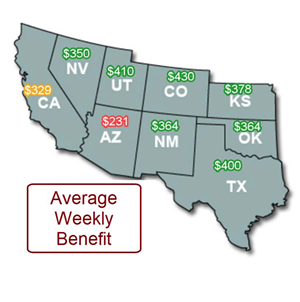Never mind the fact that the weekly $600 unemployment payments from the federal government are expiring. Arizona is four months into the COVID-19 pandemic, and some residents are still struggling to get basic benefits from the state.
Those in the metro Phoenix area and across the state continue to experience a slew of problems with the state unemployment benefits system, which is operated by the Arizona Department of Economic Security (DES).
Many are still owed backpay dating back months. Others haven't received any weekly benefits despite having filed successfully. Many say that it's nearly impossible to get staff from the agency on the phone to help them, and that they're frequently waiting for hours in clogged phone queues.
And it's all compounded by the fact that Arizona's unemployment system offers some of the lowest benefit payments in the nation — maxing out at $240 per week.
Take 30-year-old Phillip Mock, who lives in Maricopa. Work at his sales job dried up in mid-March as the pandemic entered full swing. He filed for unemployment, and his claim was eventually accepted through the state's Pandemic Unemployment Assistance (PUA) system, which was set up to funnel state and federal benefits to those who didn't qualify under the traditional benefits system.
But since being approved, Mock has only seen about three weeks of pay: one week in late April, and two weeks in May. Now, money is getting tight.
"All the weeks leading up, all the time I didn’t have my job, and all the weeks since have been 'in progress' — zero dollars," Mock said. "I still file every week. Between me and my girlfriend, we've been doing alright up until this last month when my bank account has gone into the negative." He was using her phone to speak to New Times, he said, because his phone had been shut off.
Mock's PUA claim reportedly was flagged as having one outstanding issue. (His employer had previously given him some temporary telework with reduced hours and pay to hold him over till he got on unemployment.) But he, like many other Arizonans, can't get anyone at DES on the phone to hash out the issue.
"I’ve been on hold for hours only to be ultimately kicked off," Mock said. "It’s all been incredibly inefficient and disorganized."
Like Mock, Joel Horne, 39, previously worked at recycling plants in the Phoenix area and has hardly received any unemployment benefits. Despite his PUA claim getting accepted back in early May, Horne only received two weeks' worth of $717 payments, which consisted of the state benefits and the $600 federal supplement. When he finally got a DES staffer on the phone, the person told him that his account was in limbo because he had failed a simple two-factor test online; Horne said that he doesn't recall ever having to take such a test.
Now, with no income coming in, he hasn't paid rent in two months and is struggling to make ends meet.
"The only way I’ve been getting through is selling off some of the furniture that I bought when I moved in, selling shoes, borrowing money from friends, food stamps," Horne said. "For the most part, I’m just sitting in this apartment, no TV, no cable, nothing, just a bed."
"I'm just kind of demoralized," he added.
Then there's 27-year-old Jonathan Phillips, a former tutor at Mohave Community College in Kingman. He applied for unemployment benefits in March when his job was eliminated. He was denied, but eventually realized that he would be eligible for benefits under the PUA system and applied in late June. Phillips has been getting weekly payments, but he still hasn't received thousands of dollars in backpay that the state owes him under the new pandemic relief system. Adding to his frustration, the scheduled date that his backpay was to be deposited in his account changed on a daily basis in the online system — something that many other people experienced.
"I got approved immediately, and they said benefits would be starting the next week," Phillips told New Times. "I think July 7 was my official deposit day. That being said, when the 7th hit, it got moved to the 8th, and then the 8th to the 9th. It would move daily, skipping weekends."
Phillips also said that when he did get through to DES staff by phone, he received inconsistent information. Eventually, someone told him that the agency was bogged down in work.
"Every time I called them, I got a different answer," he said. "I finally got a hold of someone who told me it’s because of lack of people and they’re too behind on paperwork, so they’re going with a first-received, first-processed fashion."
"At this point," Phillips said, "I don’t expect to receive it."
Local Facebook groups and threads on Reddit are filled with dozens of similar stories: people who haven't received backpay owed to them or ongoing weekly benefits, and who are frustrated with not being able to get through to DES staff by phone.
As of the time of this article's publication, DES staff had not provided responses to New Times' questions. Brett Bezio, a spokesperson for DES, wrote in an email that the agency was working on responses.
Dave Wells, research director at the Grand Canyon Institute, an Arizona-based non-partisan policy think tank that has published research on Arizona's unemployment benefits system, said it's clear that DES is having difficulty processing PUA claims. He pointed to data published by DES showing that, as of the week of July 25, around 783,000 people were receiving benefits through PUA claims — despite the fact that there are over 2.5 million claims still in the system.
"They’re still processing people, and they’re still having to pay back weeks, and they’re still waiting," he said. "It’s tragic, because for people trying to get through this, it’s really hard. Some bills you can put off. You won’t be evicted. But that doesn’t mean other bad things won’t happen to you."
He added that DES is likely overwhelmed with the volume of unemployment claims it is receiving and having to process, especially considering that the state's unemployment benefits system has traditionally not been very robust.
"They had to massively ramp up the staffing on it, and then on top of it they had to begin to administer programs that didn’t exist on the state level," Wells said. "That’s all stuff they’ve had to work on the fly with."

Arizona has the second lowest cap on unemployment benefits in the country, according to the Grand Canyon Institute.
Screenshot via Grand Canyon Institute
Compounding the issue is the fact that Arizona's unemployment benefits system is notoriously restrictive in who qualifies for benefits. Arizona's weekly benefits max out at $240, and you can't earn more than your weekly benefit payment before you are considered ineligible for benefits entirely.
These factors led to many Arizonians being considered ineligible under the traditional unemployment benefits system when the pandemic first hit, which subsequently caused them not to receive the $600 weekly payments from the federal government. Additionally, DES didn't establish the PUA system to cover those who weren't accepted to the state's traditional unemployment system until mid-May, meaning that people who didn't previously didn't qualify for unemployment benefits were on their own for two months.
Arizona's economy lost between $1 billion and $1.9 billion in stimulus funding because the state's unemployment system kept people from accessing the weekly $600 payments, according to a new report from the Grand Canyon Institute.
Beatrice Topete, organizing director with Unite Here 11, a labor union that has been calling on Governor Doug Ducey to raise the state's $240 unemployment benefit cap, told New Times that many of their members who work in the tourism industry (which was hit particularly hard) and at seasonal jobs at Arizona State University never saw any unemployment benefits.
"We have about 3,000 members in our union, and only about 40 percent of those that had been laid off had received the unemployment," she said. "If they were denied unemployment, they wouldn’t get the $600."
"Those folks that didn’t even qualify for unemployment were just really without anything for two months, and it was really difficult to survive," Topete added. "It has been devastating."












